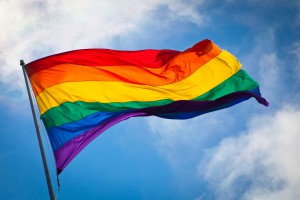LGBTQIA in Cuba: The Seven Letters of a Monochromatic Rainbow
by Orlando Luis Pardo Lazo translated by Rachel Statchelrodt / February 26, 2016 / No comments

A symbol of the LGBTIQA community. Image via Wikipedia.
How has the situation for Cuba’s LGBTQIA community changed since the persecution campaigns of the ‘60s and ‘70s?
The rainbow in Cuba is a symbol of subversion. This is very logical: in a country monopolized by the Communist Party–the only legal party since the middle of the century–-the rainbow can only have one color: red. And in the case of greater tolerance, it should have bands of the same color seven times: red, red, red, red, red, red, red.

- Is it worth-while to focus on the last images and letters coming from the inside of the last living utopia on Earth? Is Cuba by now a contemporary country or just another old-fashioned delusion in the middle of Nowhere-America? A Cold-War Northtalgia maybe? Can we expect a young Rewwwolution.cu within that Ancien Régime still known as The Revolution? I would like to provoke more questions than answers.

- Orlando Luis Pardo Lazo was born in Havana City and still resides and resists there, working as a free-lance writer, photographer and blogger. He is the author of Boring Home (2009) and is the editor of the independent opinion and literary e-zine Voces.
Of course, the symbol of today’s LGBTQIA community in Cuba cannot be an exception.
It is common knowledge that in the 1960’s, the Castro Revolution created forced labor camps, called Military Units to Aid Production (UMAP). There, laborers ended up like prisoners, without a trial and without committing any offense. Thousands of youths, homosexuals, religious people, and those with excessively intellectual tendencies were imprisoned according to the machismo of the war elites still in power today.
The Communist press mocked the victims, labeling them, without the right of objection, “highbrows,” “softies,” and “sickos,” among other fascist obscenities. Recently, Fidel Castro himself confessed his guilt in that apartheid regime.
In the 1970s, when global rejection forced the closure of the UMAP camps, the Cuban government then implemented “processes of parameterization” in all social spheres. Thousands of homosexuals, or those “suspected” of homosexuality, were expelled from their studies and professions and prevented from all labor contact with the general public in order to avoid influencing and “corrupting” our society.
Of course, one would assume that the situation on the island has now changed.
As of 2016 The Rainbow Project has been banned in Cuba, when the blog was shut down forcibly by the platform of Cuban blogs, Reflections, for violating Section 6 of the Terms of Use of the official site, where it prohibits the publication of, among other adjectives, “counterrevolutionary” text. Except that in Cuba, “counterrevolutionary” seems to be synonymous with “critical.”
The Rainbow Project, which calls itself “anti-capitalist,” is dedicated to promoting “the legal prohibition of all forms of discrimination based on sex, age, ethnic or geographic origin, religion, sexual orientation or gender identity” in Cuba. This is because “the revolution will be feminist, or it won’t be anything; It will be anti-racist, or it won’t be anything; It will be open to criticism from all citizens, or it won’t be anything; It will be anti-homophobic, or will not be nothing.”
And it happens that the Cuban authorities fear every legal citizens’ initiative because it reminds them of the Varela Project of the assassinated Oswaldo Paya, who collected more than 25,000 signatures and submitted them to the national parliament to modify the retrograde laws of the dictatorship.
The Rainbow Project’s blog is not the only one censored by the “Reflections” platform. Previously, blogs including 14 y Medio, La Jugada, Observatorio Crítico, Bubusopía, had succumbed to the regime’s censorship.
Weeks after censorship, thanks perhaps to the protests from the network of other Cuban bloggers and the reaction of the international media, The Rainbow Blog would magically reappear on the blogging platform Reflections, but this time with the controversial entry censored: “With apologies (or not) of Mariela Castro” by Jimmy Roque Martinez. The Spanish word for “apologies,” perdón, also means “forgiveness.”
In this entry, the author questions accountability for the UMAP’s forced labor camps. The gerontocracy who created them is still in power, and has been historically arrogant, believing themselves to be the infallible elite:
“It has been fifty years since the creation of UMAP and not a single official has apologized to the people. Those most responsible are still alive. The Minister of the FAR at that time is now the President of the country. It is time that they apologize for that act of criminalization, exclusion and punishment to those who were subjected — to thousands of homosexuals and Cubans with an ‘improper conduct.’ Those responsible, all men and women should recognize the error committed, and ask for a real apology directly to the victims and their families, as the only means of historical reparation.”
Here’s some ironic evidence that the situation on the island has changed today: contrary to what was happening decades ago, Cuban missing persons have now gained the privilege of return. If we still were between 1959 and 2009, for example, Jimmy Roque Martinez would have been jailed and summarily sentenced for “ideological deviation,” “insulting,” or “enemy propaganda” article.
In a personal communication, Yasmin Silvia Portales Machado, one of the coordinators of The Rainbow Project, expressed that in the end it was a “tragicomic mixture of vigilance against criticism of leaders.” It is politically impossible to mention the brothers Fidel and Raul Castro, as well as his daughter deputy Mariela Castro, as well as a “hysteria in the stands of the exterminating angels,” who still believe themselves to be the guarantors of the ideological purity of the Revolution and the personality cult.
Even after the thunderstorm, I fear that the Cuban Rainbow remain unchanged for a long time, the most monotonous rainbow on the planet. LGBTQIA communities around the world, especially in Europe and the United States, should not forget this despotic detail during their holiday travels to Castro’s castrated Cuba.




